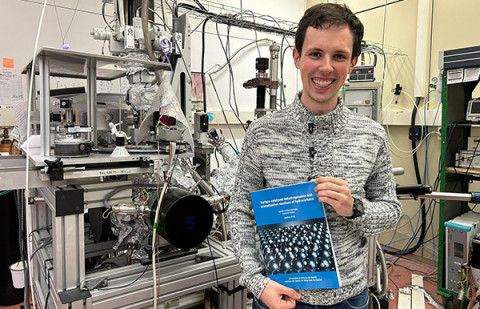Daniel Arribas is defending his thesis: "The most valuable skill one learns during a PhD is solving problems in a creative and independent way"

Daniel Arribas' smile is lately continuous on his face. The researcher is almost a doctor from the Material Science Institute of Madrid and is so happy. This thesis, entitled 'Surface-catalysed dehydrogenation and aromatisation reactions of hydrocarbons' has been supervised by Pablo Merino and José Ángel Martín Gago, from the Interdisciplinary studies based on nanoscopic systems group (ESISNA).
Why did you choose ICMM for your PhD?
I had been working here during my master’s degree and the last year of my Physics degree. I was impressed by the level of precision of the experimental techniques we had at the lab, with which we could take images with nanometre-scale resolution almost on a daily basis.
Also, the welcoming people I met in what is still my group, ESISNA, helped me a lot to decide to do a PhD here. I got the feeling I would be able to learn a lot from them and that, even though a PhD thesis can be really challenging, they would be there to help and teach me.
How would you explain your research to a non-scientific audience?
Imagine the typical objects you use in your daily life. Probably, a considerable part of them is based on organic chemistry-derived materials or substances: plastics, textile fibers, detergents, fuels, medicines, and waxes, … These are essentially composed by molecules formed by carbon atoms bonded in different ways.
To generate these products, we need to learn how to chemically modify these molecules. My research is focused on this: We try to learn more about how platinum materials affect some reactions that modify organic molecules, like for example dehydrogenation (which removes hydrogen from the molecules) or aromatisation (which essentially changes the shape of the molecules and, with that, their chemical properties). And we are able to do this at the atomic scale!
What are the main applications of your research? Could you give us an example?
My research provides fundamental insights into chemical reactions that commonly occur on catalysts. In real life, a catalyst (like the one in the catalytic converter of the exhaust in your car) is a complex material, with a complicated structure and chemical composition. That makes it very complicated to fully understand the processes taking place during the reactions.
One of the strong points of the surface science approach of my thesis is that we can simplify the problem using the surface of a well-organised Pt crystal as a model of a catalyst, in an ultrahigh vacuum environment almost completely free of contaminants. The level of control we reach is so high that we can identify the chemical configuration of the molecules in each step of the reaction with atomic precision. The reactions we study take place, for example, in some reactors in chemical industry for the processing of hydrocarbons.
What are the lessons you learned here? Which one do you value the most? How do you think this experience will contribute to your training and to your future?
Here I have learnt how to properly conduct a formal scientific investigation, from the acquisition of the data to how to communicate the results in several formats, such as poster, talks, articles and even in lessons at the university. I really value the communication skills I have acquired during my PhD, which will be extremely useful in my foreseeable future, as I plan to continue in science the next years.
However, probably the most valuable skill one learns during a PhD is solving problems in a creative and independent way. After two or three years working full-time on a specific topic with tremendously specialised machines, you end up becoming not just an expert, but the expert on your job. That means that if something breaks, a model fails or there is a problem with your data, you are most probably the only one who will be able to completely fix things. That initiative and independence in problem solving can be extended to other aspects of your life beyond science, and it is highly demanded in the labour market.
What are your plans once you finish your PhD?
I will continue doing science! I will move to Germany for a couple of years to work as a postdoc fellow at the Max Planck Institute for Solid State Research in Stuttgart. There I will use some experimental techniques I have learnt here, in combination with new techniques involving visible light, but applied this time to biological molecules.
Why did you become a scientist? Who have been your role models?
Curiosity has been my main motivation in becoming a scientist. When I was a child, I was very curious about how the universe works. For me it was a pleasure when, after having a question burning in my mind (like for example why the Moon does not fall due to the gravity) someone was able to give me an answer. And generally, after one answer question, a new one used to arise.
With the time, especially since the last years of high schools, getting answers to the new questions got more and more difficult. I suppose that it was then when the student started to transform into scientist.
Instituto de Ciencia de Materiales de Madrid (ICMM)
Sor Juana Ines de la Cruz, 3
Cantoblanco, 28049
Madrid, España
Telephone: (+34) 91 334 90 00
Email: @email
Communication Office: @email

Acknowledge the Severo Ochoa Centres of Excellence program through Grant CEX2024-001445-S/ financiado por MICIU/AEI / 10.13039/501100011033

Contacto | Accesibilidad | Aviso legal | Política de Cookies | Protección de datos
